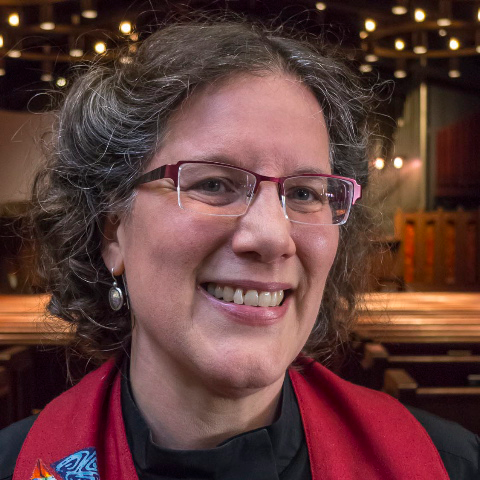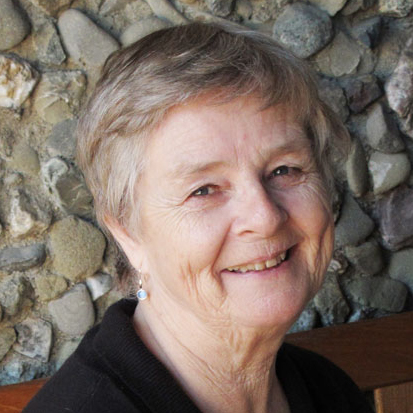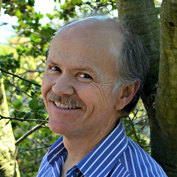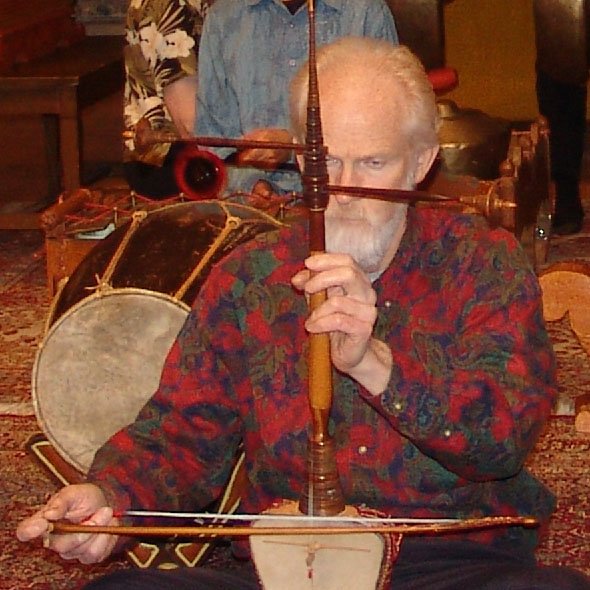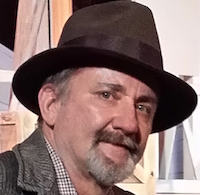REFLECTION: From “Travelling Mercies” by Anne Lamott
Writer Anne Lamott tells the story of her son, Sam who, one day, found himself lost in his Northern California neighborhood. He couldn’t recognize anything familiar. No landmarks. No people he knew. Nothing that could get him home.
Sam walked up and down street, scared. He became very anxious and started to shake. And cry.
A police car which happened to drive by saw Sam. And the officers got out to talk, and ask where he lived. But Sam couldn’t say. He couldn’t remember his address or even guess at which direction. So the officers offered to drive him around until he saw something familiar. And for a long time they drove around with Sam in the backseat looking intensely, worried, out the window. For a number of miles, tears streamed down his face as block after block passed without recognizing anything.
And then, they happened to drive by a little corner with a small white building with tall windows and big wooden doors that were open. Sam’s eyes got very large. His mouth fell open and he leapt to attention. He shrieked and pointed.
“Stop the car! Stop the car! You can let me out here!!” he said. “That’s my church! I can find my way home from here!”
“That’s my church! I can find my way home from here!”
SERMON:
“That’s my church! I can find my way home from here!”
Have you ever been so lost that nothing looked familiar? It’s he kind of thing that, if it goes on for too long, it seems like you can’t really even recognize the person staring back at you in the mirror.
It’s nice to have a landmark. Something that orients us in a confusing and morally ambiguous world. Everyone feels a little lost sometimes. What do you have that points you in the right direction? A cornerstone of faith? Some connection to truth? Some reliable or even ‘holy’ ground?
I know… this is such a place… even though many who’ve been in such a place are remiss in describing it that way.
In her novel, “Fly Away Home,” Marge Piercy has the narrator – a mother – say of her daughters:
“…We raised the girls Unitarian (Universalist), which seemed a nice, sensible compromise between having no religion at all and having to lie about what we believe. Enough religion to be respectable but not enough to get in the way.”
I’m not sure of the exact definition of a ‘back-handed compliment,’ but that’s gotta come pretty close.
As does this next example which also comes from modern scripture, Homer 3:14. That is, Homer Simpson, season 3, episode 14. This is the episode where Bart is over at the Flanders house playing the video game, “Onward Christian Soldiers.” The object of the game is for Christian soldiers to use their blaster ray to shoot bibles at the heathens and convert them. Bart is firing away, shouting, “got ‘em, got ‘em, got ‘em.” But suddenly one of the Flanders’ boys counters, “No, wait, you only winged him – he became a Unitarian.”
But for a good chastising of Unitarians, you can’t do better than Garrison Kiellor.
One episode from October 2009 had Guy Noir – private eye. A man approached Noir, looking to hire him.
TR: The name is Lukenjahn. Matthew M. Lukenjahn. I’m an alum of Gethsemane Seminary and Sports Center.
GK: Baptist, right?
TR: Right. Bible-based Baptists. So football has always been very very important at Gethsemane. We’re a Scripture-based football team — for example, we don’t use shoulder pads because they’re not mentioned in Scripture — and in the old days, if a man fumbled the ball, we cut off his hand. As it says to do in Scripture. We don’t do that anymore. But we think about doing it.
GK: That must make recruiting very difficult—
TR: This next week we’re playing our big game against U.U.U.U. The Unitarian Universalist United University. The Emersonians. Mr. Noir. And something’s up. The volume of betting is off the charts. Six million dollars has already been wagered. But U.U.U.U. hasn’t won a game in eighty-seven years.
GK: Unitarians aren’t exactly a football powerhouse, are they?
TR: They don’t know a thing about football, Mr. Noir. They don’t even bother to work up plays. They just stand around arguing in the huddle and when the play starts, they all run off in different directions. I want you to go over there and see if they have something up their sleeve.
<><><>
It’s okay to laugh. It IS funny. And I’m not suggesting that we replace our ability to laugh at ourselves with righteousness or an overinflated sense of pride. It is a good thing when a religion is able to take its work to serve others – and not itself – so seriously.
But I believe that there are inadvertent casualties that come out of our casual indifference when it comes to our brand or public image. It is part of the challenge that comes with being such a small denomination. And just so you know what I mean when I say, ‘small’, there are fewer than 200,000 Unitarian Universalists worldwide – which is less than 0.0003% of the population.
A survey taken recently revealed that over 60% of the American population have absolutely no name recognition with Unitarian Universalism at all. Not even a blip on the radar. Despite being instrumental in forming this country’s democratic design and despite 5 of the first 9 presidents of the United States being strong representatives of our churches.
It’s actually BECAUSE we often feel unknown and obscure that we get so tickled every time that Garrison Keillor or Stephen Colbert mentions us – even though, when they do, we are routinely cast as the religion ‘that doesn’t need to be taken seriously.’
But it’s also because we feel unknown that little boys like the one Merrin described get picked on at school by pint-sized disciples of mainstream religion, who’ve never even heard of a Unitarian.
I believe we’d choose to help that little boy – and ourselves – if we could only figure out how to actually explain a religion as unique and eclectic as Unitarian Universalism.
So, for a few minutes, I want to offer a little primer on what we might do if an opportunity actually did present itself to help that little boy. So, let’s imagine such a scenario.
Let’s just say that you find yourself, one evening at a school fundraiser in a local hotel. And after drinks and a presentation and pleasant company with other parents you find yourself on the elevator going down with two other sets of parents. And they happen to notice your flaming chalice tote bag or ‘Standing on the Side of Love’ t-shirt you’re wearing. And they turn to you and casually say, “Oh, Unitarian Universalism… what’s that?”
Knowing that you probably only have five floors and a walk through the lobby to explain, let me offer a few suggestions for how to handle this.
First, remove the panic stricken look from your face. Remember, yours is a religion of joy and hope – not fear.
Restrain yourself from patting your pockets or combing through your purse for one of those little cards with the seven principles on it. You never want to explain that you, “left your religion back at the church.” There is no sadder statement about your faith.
And avoid doing what your forebears and the parents of that little boy did – describing your religion by what it isn’t. Such is a fruitless endeavor. Defining ourselves by what we don’t believe just makes us a compendium of doubts and negations, containing no positive statements whatsoever.
Stretch yourself to see beyond what your religion doubts or questions to see what your religion affirms and supports. And stop feeling inferior when talking to other religions. Because the truth is that “Our faith is a larger, more liberal, more generous faith – and we believe more – not less – than other religions.”
We believe more about God, not less. We believe that it is impossible that any one approach, one idea, one way of thinking, praying or preaching could possibly illuminate the many facets of what God can be. We believe that the nature of the holy is too complex, too expansive, too mysterious and too elusive to be corralled into one entity, one being, one place, one word, one sermon or even one concept. That the divine nature of the universe is all around us, expressed in every part of creation, including each and every person. We believe that God is more, not less than what other religions claim Her to be.
We do believe that the Bible contains truth. But we also believe that there is more truth being uncovered every day – more than can be contained in any one book, by any one person or within any one institution. That the revelation of wisdom did not stop when the bible was finished. We believe that wisdom is abundant and overflowing, woven all throughout our history. It’s in our personal experience. It’s in our use of reason. It’s in the laws of nature and science. And it’s in many of the world’s other religious traditions – wherever great men and women have worked for justice, equality and love, there is truth.
We believe that living a religious life calls for more than just listening for what is true. It also requires us to listen for what is not true and stand up in situations where false claims are draped like oppression over people’s liberties.
We believe more about Jesus as well. We believe he brought about a transformational understanding of how to have more love, more faith, take more risks, and live to the highest potential humanly possible – not because he was a god – for gods can do what we mortals cannot – but because he did it as a human being – and that makes his life even more miraculous.
We believe that, beyond Jesus, there are many others who exemplified such truth and holiness in their living. Gandhi, the Buddha, Lao Tzu, Mohammed, Confucius, Martin Luther King, Jr., Nelson Mandela and the Dali Lama to name a few. And we believe that this same kind of holiness can be found in countless ordinary lives as we discover the very human revelation that love is stronger than hate, liberation more powerful than slavery, that new life can emerge in a million possible ways even after we think all hope has died.
We believe more about salvation – that despite what happens after we die – the here and now surrounds us with all the building blocks of paradise we need. Salvation is more to us than a promise to be cashed in later. It is the promise that our lives – RIGHT NOW – are more important, more influential, more necessary than most of us ever dares to imagine. And finding salvation requires more than reciting dogma or observing ritual. Salvation involves a fierce, daily dedication to love – not only with those who agree with us, but all people. We believe this takes more faith in what’s around us, not less.
We believe more about humanity as well. That each and every person not only matters in and of themselves, but they matter tremendously in the great scheme of things. Each person is part of the interdependent web and the evolving network of mutuality. Everyone has worth, regardless of what church you belong to, what faith you hold, what creed you follow, what gender you are, what political affiliation you claim, what sexual orientation, IQ, job you do, car you drive, how pretty you are or what house you live in.
And religion is more than just people. Life on this planet exists only as long as we choose to live in harmony with the sustaining tenants of nature. To live with a lesser consciousness is not only unholy, it is selfish and self-destructive.
We believe, as well, that there is much more to our faith than talking about it. We say it is in ‘deeds – not creeds’ – that our faith lives. ‘It is by more than what comes from our lips – but by what comes from our lives – that our religion is measured.’
And this is demonstrated when you look at history. Unitarian Universalism has had a disproportionately greater per capita impact on the evolutionary arc of education, justice – social and health reforms – than most any comparable religious influence. Despite our small numbers, forebears of our faith created such agencies as the Red Cross, the NAACP, and the ACLU. We were on the front lines of the ordination of women, giving women the right to vote, civil rights, reproductive justice and now marriage equality and gay, lesbian and transgender concerns. The Unitarian Service Committee began rescuing victims of Nazi terror years before our country was ready to admit that something immoral was happening in Europe. We were the religion of people like Emerson, Thoreau, Ben Franklin, five US presidents, countless poets, authors, and several Nobel Prize winners.
People, we have no reason to feel religiously inadequate. Our religion is more not less. And part of that includes the understanding that there are more people who can share this good news. You don’t have to be chosen or ordained to talk about our faith. You simply have to care about your world and our religion. And you have to care about our children – and their future – as well.
I have learned to articulate our faith as loudly and clearly as I can in hopes that little boys like the one Merrin described in her story won’t have to deal with bullies from the moral majority whose only understanding of us comes from some misguided TV humor. I talk about Unitarian Universalism loudly and proudly so that little boy can grow up proud and protected by the community he belongs to instead of pressured to deny it. So that he will be admired – at least respected – for the faith he claims. And so that, someday, the love and reason and hope and courage given to him might help him make a real difference in a hurting world.
But mostly, I have learned to articulate our faith – and encourage other people to do so – because that little boy Merrin described this morning was me. I asked her to tell you my story… so you would know what I went through – and then multiply that by the 40,000 children who grow up Unitarian Universalist at any given moment – many of them unsupported and undefended by a faith that espouses prophetic love and courage.
I have gone back to the church I grew up in time and time again, asking them to understand how painful it was to feel abandoned by the tradition I was told to feel proud of. I asked them to imagine and recognize that when they want their children to be raised in an open-minded and tolerant faith but are unwilling to promote it themselves, they are unwittingly throwing their children onto the front line of a religious battleground. Why do we leave our children to wander through the landmines of ignorance and bigotry without guides? For that matter, why do we let adults like Mary – who are looking for places just like this one to help them find their way home. Long ago, I made a promise not to let that happen to other children and I ask you to join me in that promise.
So, what do you believe? Is there such a thing as a faith community with the power to offer social, spiritual or existential GPS. The kind that will kick in when you’re feeling lost or forgotten or bullied in this world? When you walk out your door and see corruption, carelessness and a reckless callousness toward people or the planet, is there some place you can turn to find your way home? Can you look out the window of your metaphorical patrol car, see a reassuring sign and say, “Stop! That’s my church! I can find my way home from here.” And does that source of hope and meaning come with time-trusted, justice-tested, caring people ready to help light your path and give you good company?
If you don’t, welcome to such a place.
If you do, how do you describe it? When the guy in the elevator asks about your chalice… when the religious bully talks about hate and intolerance… When you see someone lost, what do you say?
The next time it happens, forget about this sermon. Forget about the pamphlets, the classes, the cards or the slogans. Just call up on the love you feel when you’re around open minded, open hearted people and say this:
Unitarian – one planet. Universalism – all people.
No room for hate. No time for apathy or ignorance.
Everybody is needed. Everybody is welcome.
To the Glory of Life.
Copyright © 2014, Rev. Greg S. Ward. All Rights Reserved.







